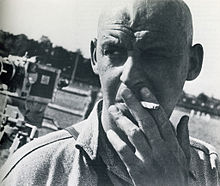Alexander Rodchenko
Appearance

Aleksander Mikhailovich Rodchenko (5 December 1891 – 3 December, 1956 was a Russian artist, sculptor, photographer and graphic designer. He was one of the founders of Constructivism and Russian design; he was married to the artist Varvara Stepanova.
| This article about an artist is a stub. You can help out with Wikiquote by expanding it! |
Quotes
[edit]- I reduced painting to its logical conclusion and exhibited three canvases: red, blue and yellow. I affirmed: it's all over. Basic colors. Every plane is a plane and there is to be no representation.
- Quote in: 'The Death of Painting'; from the MoMA-website: Interactives: texts
- Rodchenko is looking back: in 1921 he executed what were arguably some of the first true monochromes (artworks of one color; source, Wikipedia:Rodchenko)
- [my goal is] to photograph not a factory but the work itself from the most effective point of view.. ..in order to show the grandness of a machine, one should photograph not all of it but give a series of snapshots.
- Quote, 1930: from Rodchenko lecture at the October group's meeting; as quoted by Margarita Tupitsyn in Chapter 'Fragmentation versus Totality: The Politics of (De)framing', in The great Utopia - The Russian and Soviet Avant-Garde, 1915-1932; Guggenheim Museum, New York, 1992, p. 486
- the issue was not to take 'photo pictures' of the entire object but to make 'photo stills' of characteristic parts of an object
- One has to take several different shots of a subject, from different points of view and in different situations, as if one examined it in the round rather than looked through the same key-hole again and again.
- Quoted on Wikipedia:Rodchenko
Quotes about Aleksander Rodchenko
[edit]- ..one should not depict an isolated building or a tree which may be very beautiful but which will be.. ..painting, will be aesthetics.
- Osip Brik, in his essay, 1928; as quoted by Margarita Tupitsyn in Chapter 'Fragmentation versus Totality: The Politics of (De)framing', in The great Utopia - The Russian and Soviet Avant-Garde, 1915-1932; Guggenheim Museum, New York, 1992, p. 486
- Brik criticized Rodchenko's photography for its detachment from the "social demands" of the time and for attempting to resolve purely painterly goals by means of photo language


